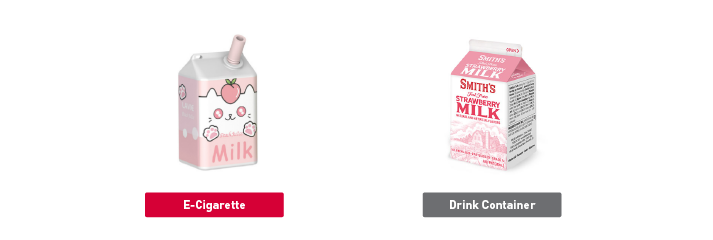- Center on Health Equity & Access
- Clinical
- Health Care Cost
- Health Care Delivery
- Insurance
- Policy
- Technology
- Value-Based Care
E-Cigarettes Packaged as Youth-Appealing Items Prompt FDA Warning Letters
The warning letters issued to 7 manufacturers are part of a larger, ongoing effort by the FDA to address the manufacturing, distribution, and sale of illegal and unauthorized e-cigarettes.
This article was originally published by Contemporary Pediatrics®. It has been lightly edited.
The FDA has issued warning letters to several online retailers for selling unauthorized e-cigarettes that look similar to soft drink bottles, drink containers, or youth-enticing toys, according to a recent press release.
The FDA explained that the products (example pictured on right) could help children and youth hide or conceal the e-cigarettes from adults. Conversely, they could also be confused with everyday objects, which could potentially cause an accidental ingestion from young people. The federal agency stated it is important for teachers and other adults who work with children to be aware of the illegal products.
E-cigarette versus a drink container
Image credit: FDA

“As we continue into the school year, it’s critical that parents, teachers, and other adults are aware of illegal e-cigarettes deceptively packaged to look like everyday items,” Brian King, PhD, MPH, director of FDA's Center for Tobacco Products, said. “These types of products can be easily concealed and contain nicotine, which is highly addictive and can harm the developing adolescent brain.”
The products specifically highlighted in the FDA’s warning letters include e-cigarettes that imitate drink containers for youth-appealing drinks, such as slushies, soft drinks, and milk, and those that are designed to look like toys, including action figures, phones, and dice.
According to findings from the 2023 National Youth Tobacco Survey (NYTS), the researchers observed a decline in e-cigarette use among high school students since 2022, though an increase in overall tobacco product use, including e-cigarettes, among middle school students was observed.
The retailers lack authorization from the FDA to sell or distribute e-cigarettes in the United States, a requirement under the Federal Food, Drug, and Cosmetic Act (FD&C). The 7 retailers that were issued warnings were given 15 business days to respond with steps that will correct any violations and prevent future violations.
The warning letters are a part of a larger effort being carried out by the FDA to address illegal e-cigarettes that appeal to young people. Injunction, seizure, and civil money penalties could be consequences if the retailers fail to comply or promptly correct the violations.
According to the press release, as of November 2023, the FDA has issued approximately 630 warning letters for the manufacturing and distributing of illegal e-cigarette products and devices, as well as over 400 warning letters to retailers for the sale of unauthorized e-cigarettes.
The agency has also filed civil money penalty complaints against 35 e-cigarette manufacturers and 42 retailers for manufacture or sale of the unauthorized products. Additionally, the FDA has worked with the Department of Justice to “seek injunctions against 6 manufacturers of unauthorized e-cigarettes.”
Reference:
FDA warns retailers to stop selling illegal youth-appealing e-cigarettes disguised as everyday items. FDA. Press release. November 16, 2023. Accessed November 21, 2023. https://www.fda.gov/tobacco-products/ctp-newsroom/fda-warns-retailers-stop-selling-illegal-youth-appealing-e-cigarettes-disguised-everyday-items
Preventing Respiratory Illness and Death Through Tighter Air Quality Standards
June 1st 2021On this episode of Managed Care Cast, a research scholar at the Marron Institute of Urban Management at New York University discusses the latest findings in the Health of the Air report, which was presented at the recent American Thoracic Society 2021 International Conference.
Listen
